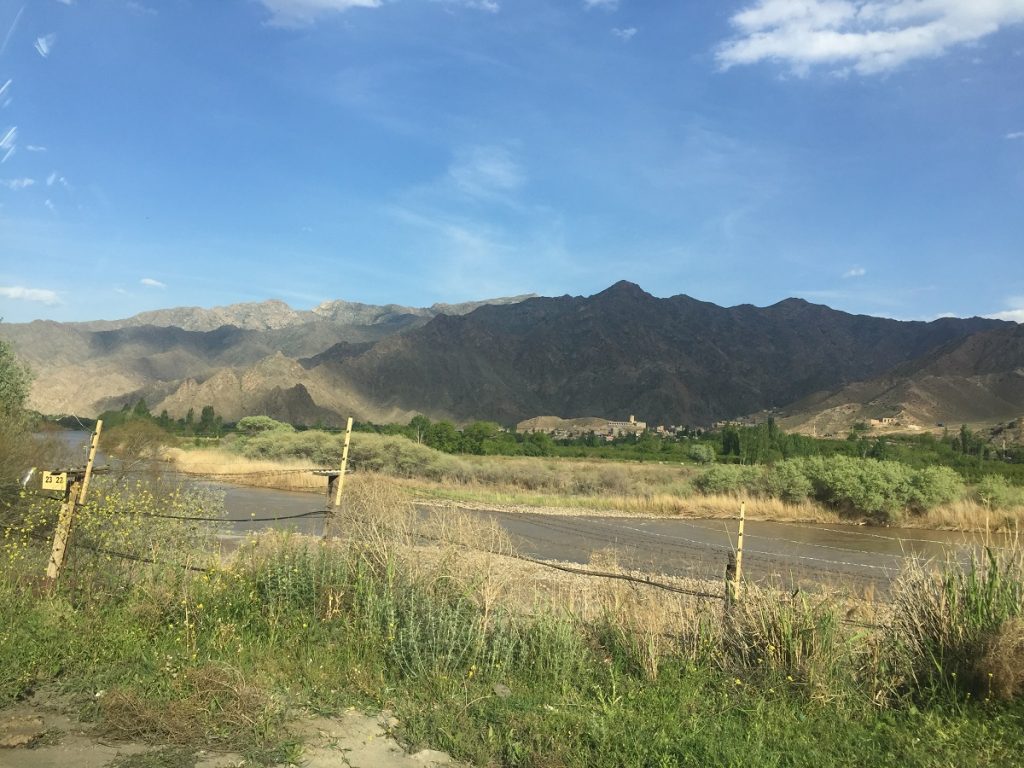Iran’s new hardline president – what to expect in the Caucasus
Influence of Iran in the South Caucasus, Azerbaijan, Armenia, Georgia
The election in June 2021 and the inauguration of Ebrahim Raisi on August 5 as president of Iran was an event of great importance for the Middle East region – despite the fact that officially this position has little influence in the political system of the country.
According to the almost unanimous opinion of international analysts, Ebrahim Raisi is a very influential figure in the country.
This ultra-conservative politician is likely to become the new Grand Ayatollah, the true ruler of Iran.
Who is Ebrahim Raisi and what could the emergence of a hardline leader in power in Iran mean for the South Caucasus? The context and perspectives were commented on for JAMnews by experts in Baku, Yerevan and Tbilisi.
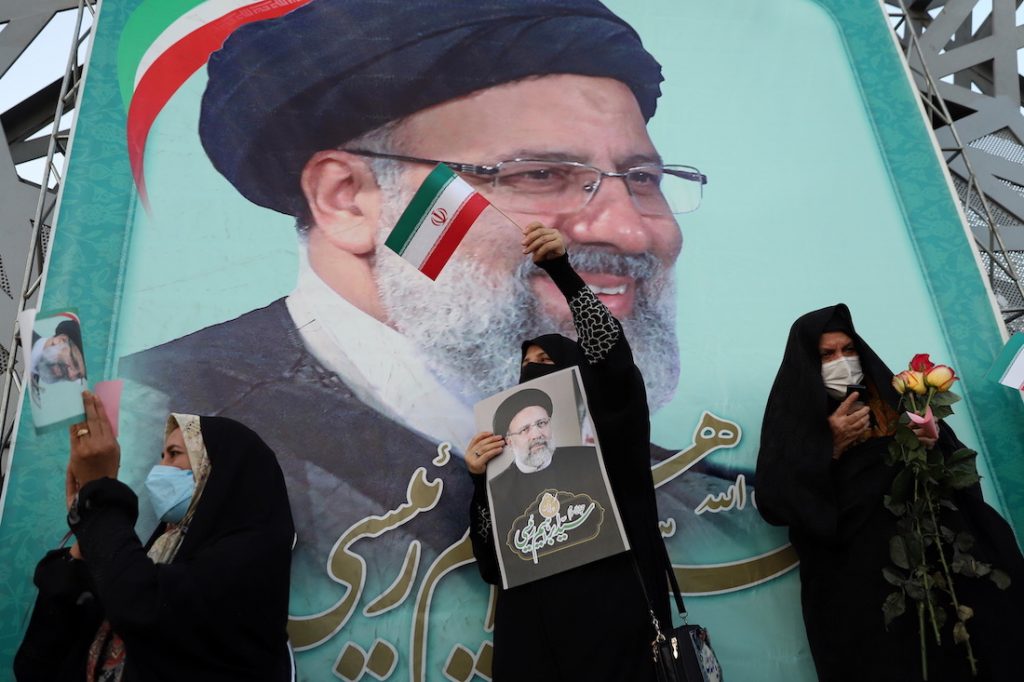
The path of Ebrahim Raisi
Raisi, 60, succeeded Hassan Rouhani, who was considered relatively moderate in the West. The image of the new president is rather the opposite.
The highly religious former head of Iran’s judiciary, Raisi was implicated in the executions of thousands of political prisoners in the 1980s. Then a revolution took place in the country, and it ceased to be a secular state and became the Islamic Republic of Iran, headed by Ayatollah Ruhollah Khamenei.
- What is behind Iran’s involvement in the ongoing Armenian-Azerbaijani border crisis
- “Georgia is already my home” – stories of Iranians who moved to Georgia
- Opinion: How will Europe’s involvement in Armenia affect its future and ties with Russia
While still a student, Raisi participated in protests against the West-backed Shah and in his 1979 overthrow. He became Tehran’s deputy prosecutor when he was only 25 years old.
In this position, he became one of four judges sitting on secret tribunals known as the “Death Committee”, which sentenced political prisoners to death.
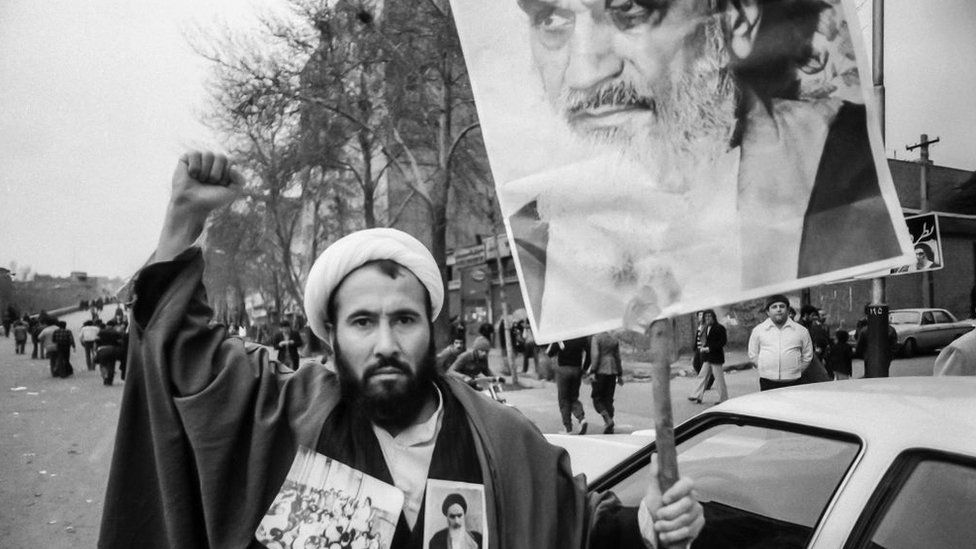
The people killed by the Death Committees were buried in unmarked mass graves. Raisi has repeatedly denied his role in the death sentences. But at the same time he said that they were completely correct, because they carried out the fatwas (religious orders) of the supreme leader Ayatollah Khamenei.
In 2019, the United States imposed sanctions on Raisi for alleged human rights violations. In particular, he was charged with the execution of minors and brutal repression of the opposition following the controversial 2009 presidential elections.
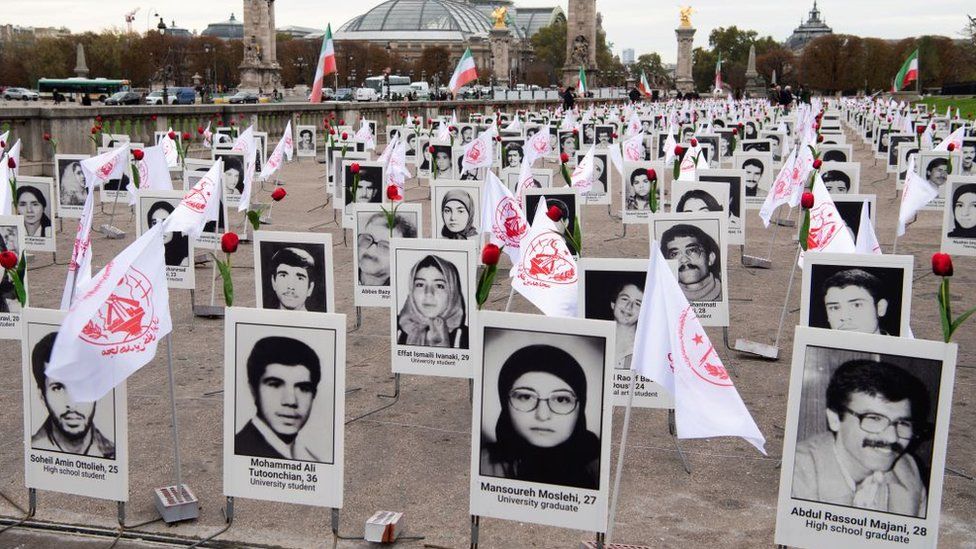
Raisi wears a black turban, which in Shiite tradition means that he is a descendant of the Prophet Muhammad. He was born in 1960 in Mashhad, Iran’s second largest city, home to the country’s most sacred Shiite Muslim shrine.
His father was a priest and died when he was five years old. He followed his father’s example and at the age of 15 began attending seminary in the holy city of Qom.
Little is known about his personal life. His wife Jamile teaches at a university in Tehran and they have two grown daughters. His father-in-law is Ayatollah Ahmad Alamolkhod in Mashhad.
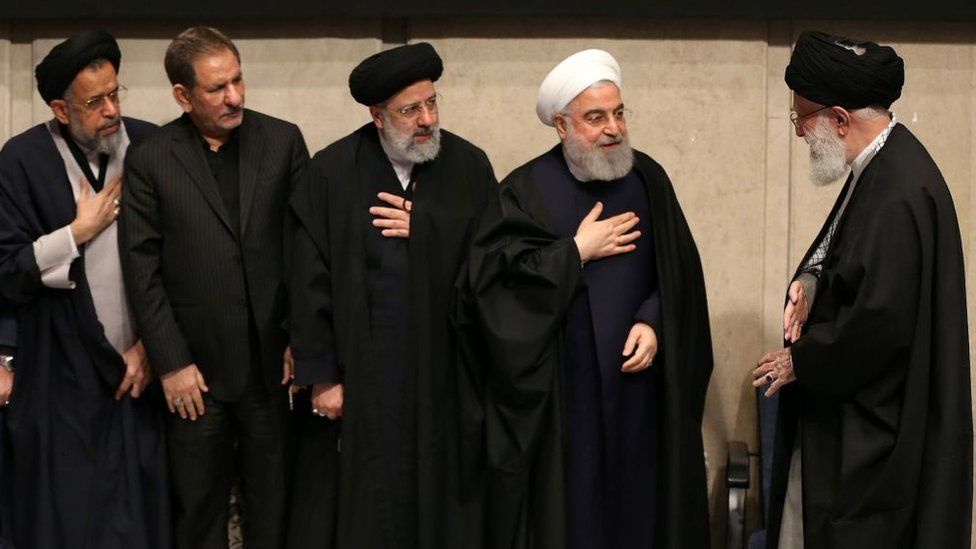
In 2014, Raisi was appointed as the Attorney General of Iran. Two years later, Ayatollah Khamenei appointed him the custodian of one of the most important and richest religious funds in Iran – Astana-e Quds-e Razavi.
Raisi also manages the shrine of the eighth Shiite Imam Reza in Mashhad, as well as many related charitable organizations and large-scale holdings in construction, agriculture, energy and telecommunications.
In 2017, Raisi already ran for president, but came in only second with 38%. But in 2019, Ayatollah Khamenei appointed him to the influential position of head of the judiciary.
And just a few days later, he was also elected deputy chairman of the Assembly of Experts – this is an important structure that consists of 88 representatives of the clergy and it is she who elects the next Supreme Leader of Iran, Ayatollah.
As head of the judiciary, Raisi carried out reforms that reduced the number of executions in the country. However, Iran still sentences more people to death than any other country in the world except China.
In the presidential elections in 2021, Raisi presented himself as a fighter against corruption, poverty and discrimination. International experts agree that almost all of Raisi’s serious competitors were removed from the election race, and he won a crushing victory, gaining 62% of the votes in the first round.
However, turnout was less than 49% – a record low for a presidential election since the 1979 revolution.
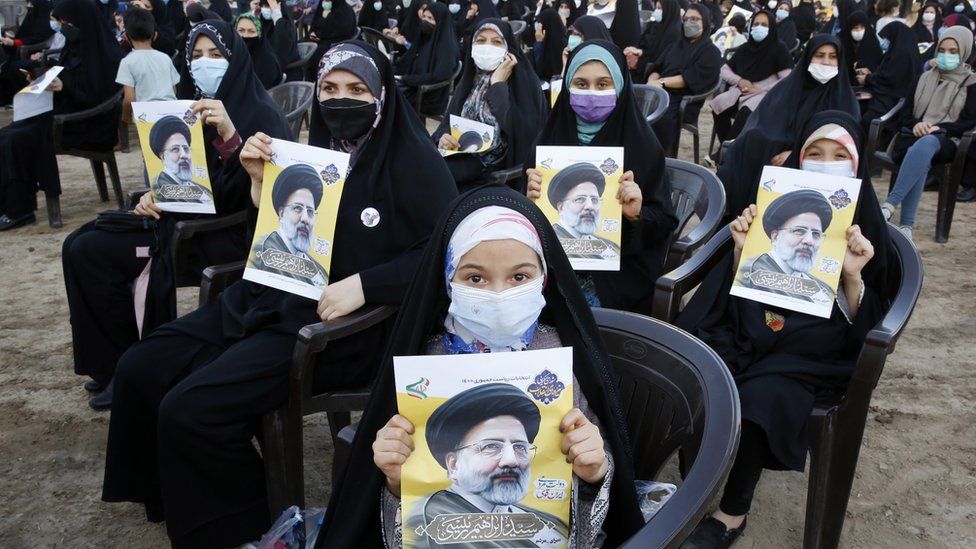
- The main problems that the new president will have to solve:
- A weakened economy, a sharp rise in the cost of living.
- Severe shortage of drugs – Iran blames US sanctions for this.
- Coronavirus pandemic. It is the most affected country in the region.
- Iran is shaken by a wave of street protests in the southwest, fueled primarily by severe water shortages.
Azerbaijan-Iran: main contexts
Political observer Agshin Kerimov comments, Baku
Promoting Shia Islam
“Iran is interested in spreading radical Shiite Islam in Azerbaijan and thus strengthening its influence. Azerbaijan manages to neutralize groups associated with Tehran. But it would be foolish to assume that Iran will stop working in this direction.
“This happened while Hassan Rouhani, a representative of the liberals, was president in Iran. It is naive to expect any drastic changes under Raisi. And in general, regardless of the ideology of the president of this country, Azerbaijan’s foreign policy relations with Iran in any case are built at the level of the supreme spiritual leader – the Ayatollah.
Iran’s relations with Armenia
“The main expectation of official Baku from Tehran is the cessation of close contacts with the occupier – with Armenia. Baku expects Iran to advance relations with Armenia only after the Armenian authorities abandon revanchist rhetoric.
Zangezur corridor
“And, apparently, Iran in a sense wants this, as it declares the importance of the Zangezur corridor. This road would be an excellent economic “window” for Iran and would give it great trade benefits.
The Zangezur corridor is a hypothetical transport route with a length of about 40 km, which will provide a ground connection between Azerbaijan’s autonomous republic of Nakhichevan and the rest of the territory of Azerbaijan, but for this it must pass through the territory of the Syunik region of Armenia. In Yerevan, this plan has not yet been adopted and is causing great protests from the opposition and a large part of society.
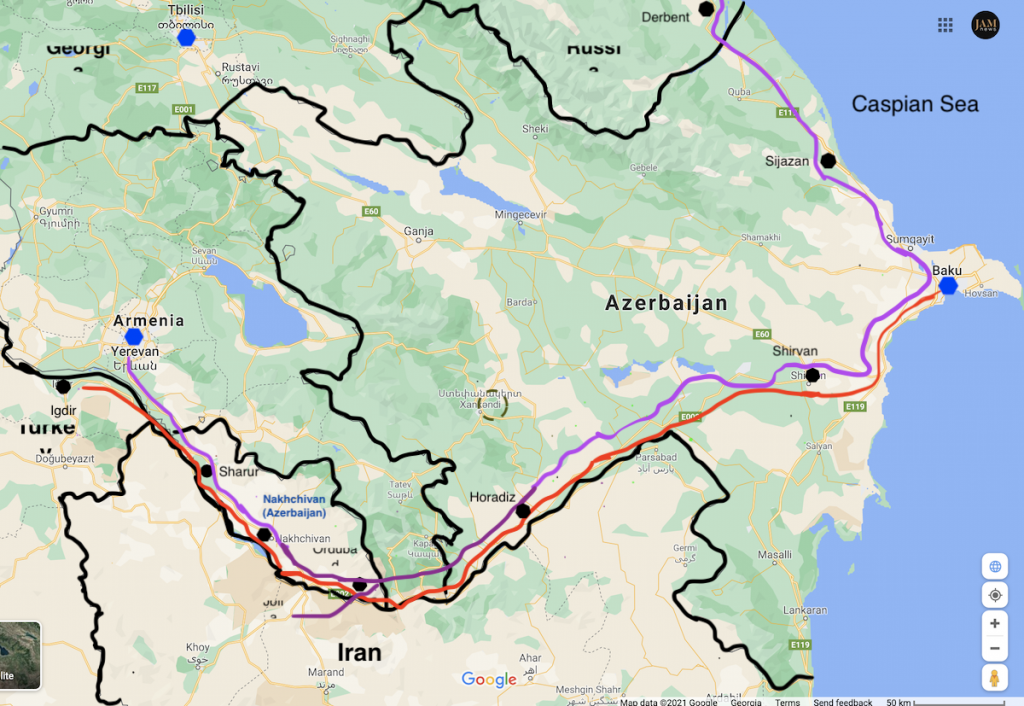
Perhaps Iran is urging official Yerevan on the issue of opening the Zangezur corridor.
But Tehran has its own “red line” in this matter. This is the creation of a new Azerbaijani strip on the border with Armenia. Iran has not yet accepted this plan.
Turkey as an annoying factor for Iran
“The Turkish factor is irritating to Iran. Azerbaijan is establishing its “new old borders” with Armenia amid growing cooperation with Turkey and Israel.
Great Britain also supports Azerbaijan in this regard, although it does not make official statements. The United States and the European Union are very interested in the delimitation and demarcation of the borders between Azerbaijan and Armenia.
But Iran is not yet ready for this. And the reason for this is the transfer of global rivalry to close proximity to its borders.
Recently, the Iranian ambassador to Armenia visited the border zone with the Azerbaijani Kelbajar region. By doing so, Tehran demonstrated its zeal for defining boundaries. Although the status of the ambassador to the border is still unclear.
Economy
In the bilateral relations between Azerbaijan and Iran, economic ties, huge trade turnover are in the foreground, and both states are interested in the further development of the processes.
Good conditions for this are created by the long common land border, as well as the railway, which is an integral part of the North-South international transport corridor.
The two countries also have common interests in the Caspian Sea, although there are more problems here. For example, Azerbaijan has already agreed with Turkmenistan on the joint development of the Druzhba field. But there are still many unresolved issues with Iran at sea.”
Armenia-Iran: Main Contexts
Expert of the Armenian Institute of International Relations and Security Emma Begidzhanyan comments
Iran does not need a transport corridor through Armenia, which Azerbaijan insists on
“During the election campaign, Ebrahim Raisi had little to do with foreign policy, but he still outlined the main vector. He said that in foreign policy, ‘he gives priority to his neighbors.’
Armenian Prime Minister Nikol Pashinyan attended the inauguration of Ibrahim Raisi. Their meeting took place, after which they both stated that they attach great importance to the development of bilateral relations, Armenian-Iranian projects, as well as stabilization in the region.
It is not profitable for Iran that any transport corridor passes through the territory of Armenia. This will negatively affect its geopolitical position, since today a road passes through the territory of Iran, which is used by Azerbaijan and Turkey. It is this path that connects Azerbaijan with its autonomy of Nakhichevan.
Iran can now use this road as a serious argument in relations with Azerbaijan and Turkey. Some problems will arise – and Iran may close the path to the Nakhichevan autonomy.
If a corridor opens through the territory of Armenia, Azerbaijan and Turkey will no longer need the road through Iran.
And that is why Iran needs an alternative road to Russia, which will go through Armenia and Georgia. Tehran needs to get this transit route before opening an alternative road for Azerbaijan to Nakhichevan (via Armenia).
South Caucasus under Turkish influence
After the collapse of the Soviet Union, Russia, Iran and Turkey did everything to establish their influence in the South Caucasus. At present, Turkish influence dominates in Georgia and in most of the region. Now everything is being done so that Armenia finds itself in the same context.
The West gives a carte blanche to Turkey in order to boot Russia from the region. What will happen next, what will be the fate of Georgia, what will become of Armenia – is not so important for the West.
In the future, it is very possible that the West will soften its relations with Iran in order to increase its role in the region and use it as a counterweight to Turkey. But today there are no such concrete steps yet”.
Georgia-Iran: Main Contexts
Comments by Giorgi Sanikidze, Director of the Georgian Institute of Oriental Studies
Iran’s influence is low and will remain so
Iran is trying to be active in the Caucasus, but compared to other regional and external players, its role in this region is very insignificant. A similar situation will be observed during the presidency of Ibrahim Raisi.
But there is one important factor. Since the end of the second Karabakh war, the situation has changed significantly. One could expect Iran to be closer to Azerbaijan, given the religious and historical context. In addition, part of the Iranian border, which was under the control of Armenian forces, is now the border with Azerbaijan.
And yet Iran has become closer to Armenia.
Iran is in a subordinate position in relation to Russia, and this is a problem for Georgia
It is important to take into account that Iran is a country that is historically interested in the South Caucasus, but at the same time, Russia’s interests are in the first place for it. Iran is in a subordinate position in relation to Russia, and this determines, among other things, its priority attitude towards Armenia. And this is a serious problem for Georgia.
The second problem for Georgia is transit corridors.
One is North-South: it starts in India, passes through Iran, then through Azerbaijan, then through Russia. Russia is very interested in this corridor. But there are no prospects here either for Georgia or for Armenia.
The second project is the idea of connecting the Persian Gulf and the Black Sea by transit. For Georgia, there is interest in it, since in this case Georgian ports will be involved.
Iran’s role in the Caucasus can be talked about if sanctions are lifted
But in all contexts, it is premature to give any assessments of Iran’s political or economic influence in the South Caucasus. Iran is under such severe Western sanctions that it cannot take any impressive action.
On the one hand, negotiations on stopping Iran’s nuclear program and lifting sanctions have resumed. But there are still many contradictions between the United States and Iran, and recently the positions on both sides have become even tougher.
There is still a chance that the agreement will be signed. It is vitally important for Iran to get it, although without losing face and dignity. And after that, one can expect that Iran will become more active in the South Caucasus. However, this is not a short-term perspective.”










